Whether you’re managing a boutique hotel or overseeing a sprawling resort, your phone system is the lifeline that keeps your operations running smoothly. U.S. hotel occupancy is projected to reach 63% in 2025,1 and outdated phone systems simply can’t keep up with modern demands.
That’s where cloud telephony comes in. Gone are the days of clunky PBX systems and tangled wires – cloud telephony offers the flexibility, mobility, and features your hotel needs to free your staff from the front desk and transform your guest experiences. Read on to learn everything you need to know about cloud telephony and how it can streamline your hospitality operations.
What Is Cloud Telephony?
Cloud telephony, also known as cloud calling or hosted PBX, is a modern approach to business communications that leverages the internet. Rather than relying on traditional on-premises phone systems, cloud telephony moves your entire phone infrastructure to the cloud. This means your business phone system is hosted and maintained by a third-party provider, accessible from anywhere with an internet connection.
Cloud phone systems let you make and receive calls from any internet-connected device, whether it’s a VoIP desk phone, smartphone, or computer. This flexibility is particularly valuable in the hospitality industry, where staff are often on the move and need to stay connected across various locations within a property.
However, cloud telephony service is more than just making phone calls over the internet. It’s a unified communications solution that integrates voice calling with other essential business tools like voicemail, instant messaging, video conferencing, and even customer relationship management (CRM) systems. For hotels, this could mean seamlessly connecting your front desk, housekeeping, and concierge services, all through a single platform.
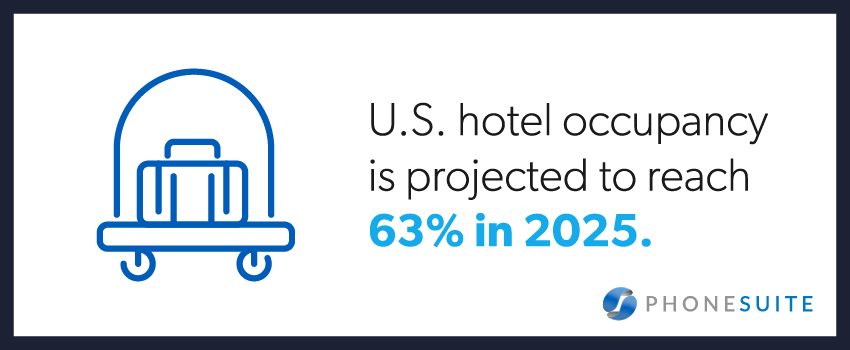
How Does Cloud Telephony Work?
A cloud telephony system works by converting your voice into digital signals that are transmitted over the internet. Here’s a step-by-step breakdown of the process:
- Voice Conversion: When you speak into your phone or device, the system converts your voice into digital data packets.
- Data Transmission: The data packets are then sent over an internet connection to your cloud telephony provider’s data centers.
- Call Routing: The provider’s servers process the data and route the call to its destination, whether it’s another extension within your hotel or an external number.
- Reverse Process: On the receiving end, the digital data is converted back into audio, allowing the person on the other end to hear your voice.
This entire process happens in milliseconds, providing a seamless cloud calling experience that’s often indistinguishable from traditional phone lines.
6 Benefits of Cloud Telephony Services
Cloud telephony is a strategic investment that can provide significant benefits to your hospitality business, including:
1. Cost-Effectiveness
One of the most immediate benefits of cloud telephony is its potential for cost savings. Installing a traditional PBX system often requires a hefty upfront investment in hardware in addition to ongoing maintenance costs. With cloud telephony solutions:
- You don’t need expensive on-site hardware
- You pay only for the services and phone lines you need
- Your service provider handles maintenance and upgrades
- Long-distance and international calls are often cheaper
For budget-conscious hoteliers, this shift from capital expenditure to operational expenditure can make a significant difference to the bottom line.
2. Scalability and Flexibility
A cloud phone system lets you add or remove lines during peak seasons or for special events without adjusting your infrastructure. This means you can quickly set up temporary extensions for pop-up services and event spaces to ensure your communication capabilities always match your current needs.
Cloud technology also makes adding new locations to your existing communication ecosystem easy. Whether you’re looking to expand your boutique hotel or standardize communications across a large chain, cloud telephony provides the flexibility to adapt your phone system to your changing business needs without physical hardware limitations.
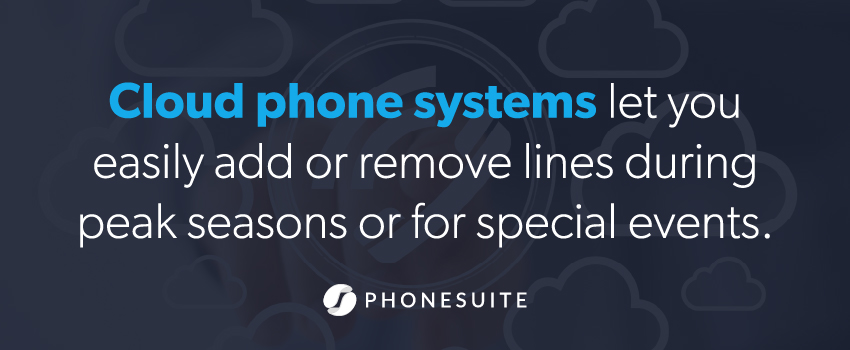
3. Enhanced Mobility
Hotel staff are rarely tied to a desk, and cloud telephony services support your mobile and remote workers in ways that traditional systems can’t match. Staff can manage calls from any device, anywhere on the property – or off-site. Cloud systems also enable seamless call transfers between devices, so a front desk agent could start a call on the desk phone and transfer it to their mobile device if they need to step away.
4. Advanced Features
Cloud telephony systems come packed with features and collaboration tools that can enhance staff productivity and guest experiences, such as:
- An auto-attendant for efficient call routing
- Status updates to keep operations running smoothly
- Voicemail-to-email for easy message management
- Video conferencing capabilities for virtual meetings with staff or suppliers
- Call analytics to help optimize staffing and service levels
Many cloud-based phone solutions also offer seamless integration with hotel management systems, so you can create a unified platform that streamlines operations across all departments. For example, a guest’s call history could be automatically logged in their profile in your CRM system, allowing for more personalized service in future interactions – a must, considering 78% of travelers prefer to book accommodations that offer personalized experiences.2
5. Business Continuity
Cloud telephony services offer built-in redundancy that ensures continuous service even in the face of local outages or hardware failures. Unlike a traditional business phone system where a problem with your on-premises PBX could take out your communications, cloud telephony providers typically operate multiple geographically dispersed data centers. If one has an issue, your phone service can failover to another without any noticeable interruption to your staff or guests.
Additionally, a cloud telephony phone system simplifies disaster recovery efforts. If a local emergency renders your property inaccessible, calls can be easily rerouted to alternate locations or mobile devices so that you can always maintain communication with guests and staff.
6. Better Guest Experience
Cloud telephony services let you offer faster response times to guest queries, whether they’re calling before their stay, from their rooms, or after check-out. The system’s advanced features also allow for more efficient room service and housekeeping requests, reducing wait times, and improving guest satisfaction.
Cloud Telephony vs. Traditional PBX Systems
To fully appreciate the advantages of cloud telephony, it’s helpful to compare it with traditional PBX (Private Branch Exchange) systems that have long been the standard in hotels.
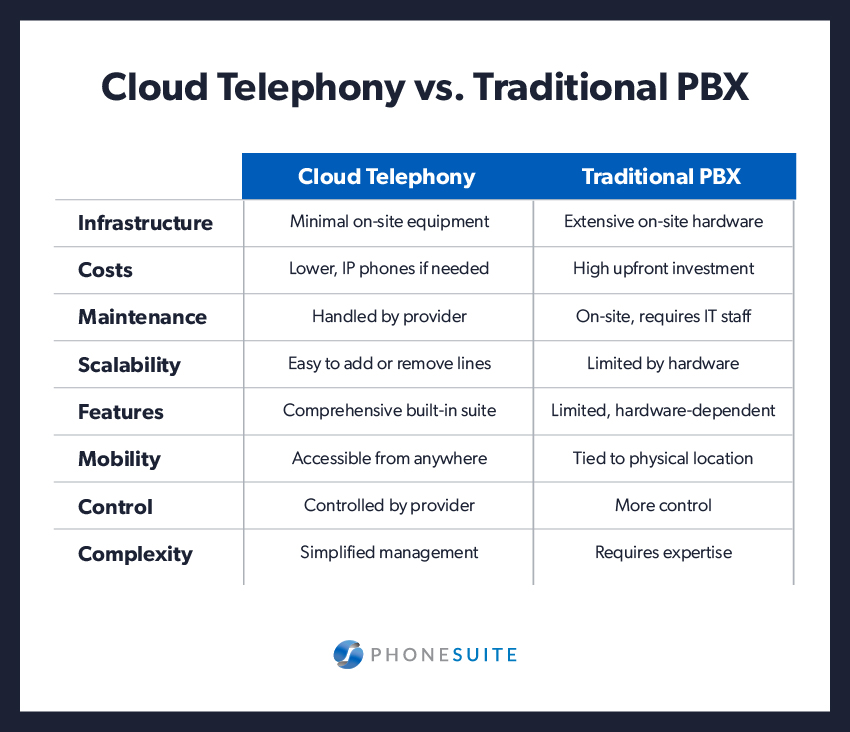
- Infrastructure: Traditional phones require extensive on-premises hardware, including a central control unit, desk phones, and complex cabling. Cloud telephony minimizes on-site equipment, with most of the system hosted in the cloud.
- Costs: A traditional PBX solution often comes with high upfront costs for equipment and installation. A cloud phone system involves a much lower initial investment, typically just for IP phones if needed.
- Maintenance: Traditional phone systems require regular on-site maintenance and often need dedicated IT staff. Cloud telephony service shifts this burden to the provider, who handles maintenance and updates remotely.
- Scalability: Traditional PBX systems are limited by physical hardware, making scaling up time-consuming and expensive. Cloud telephony excels in scalability, allowing easy addition or removal of lines through software adjustments.
- Features: Traditional PBX solutions often have limited features, with expansions requiring additional hardware. Cloud telephony typically offers a wide range of advanced features, which are easily updated through software.
- Mobility: Traditional phone systems are usually tied to physical locations and desk phones. A cloud system offers accessibility from anywhere with an internet connection on any device.
- Control: A traditional PBX system offers more direct control over hardware and software but requires on-site expertise to manage effectively. Cloud phone services provide a user-friendly interface for system management, but ultimate control of the infrastructure lies with the provider.
- Complexity: Traditional phone systems can be complex to set up, maintain, and troubleshoot, often requiring specialized knowledge. Cloud telephony simplifies many aspects of system management with a more intuitive interface and provider-handled backend complexities.
For most modern hotels, the flexibility, cost-effectiveness, and advanced features of cloud telephony make it a clear winner over traditional phone solutions.
Cloud Telephony vs. VoIP Systems
While cloud telephony and Voice over Internet Protocol (VoIP) technology are often thought of as interchangeable, there are important differences between the two.
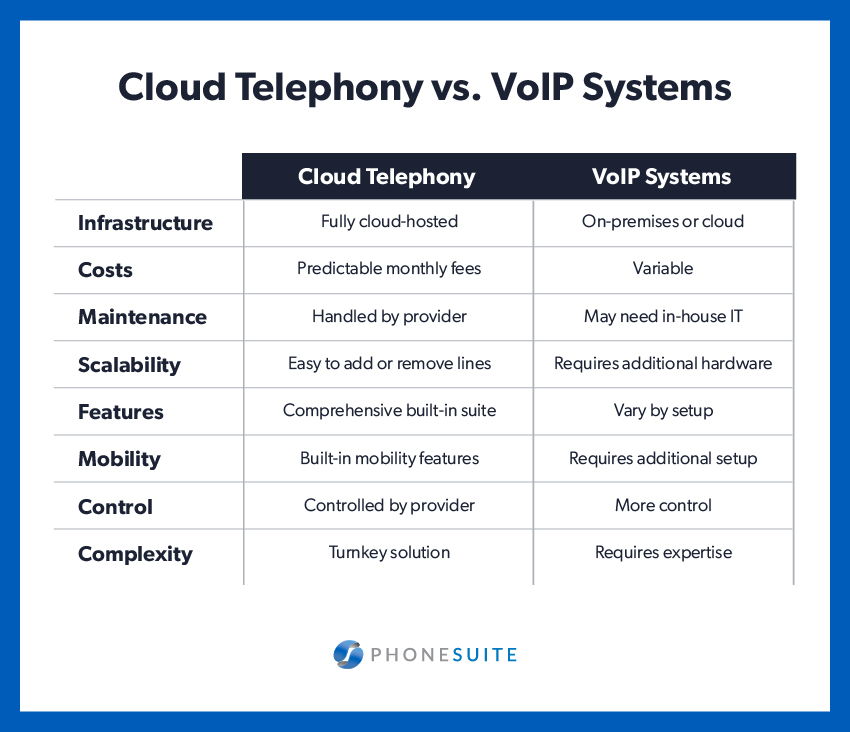
- Infrastructure: VoIP systems can be hosted on-premises or in the cloud, often requiring some level of in-house management. Cloud telephony is fully hosted and managed in the cloud by the service provider.
- Costs: VoIP costs can vary, potentially having higher upfront costs but lower ongoing fees. Cloud telephony usually involves a predictable monthly fee based on usage.
- Maintenance: VoIP may require in-house IT staff for maintenance and troubleshooting. With cloud telephony, maintenance is handled entirely by the service provider and deployed over an internet connection.
- Scalability: Both systems are scalable, but VoIP phones may require additional hardware or software licenses. Cloud telephony is typically easy to scale through the provider’s web interface.
- Features: Features in VoIP systems can vary widely depending on the specific setup. A cloud telephony solution usually offers a built-in suite of advanced features.
- Mobility: A VoIP service provider can offer mobility features, but these may require additional setup or apps. Cloud telephony typically includes built-in mobility features, allowing seamless use across devices and locations without extra configuration.
- Control: VoIP offers more flexibility in terms of customization and control but requires more technical expertise. A cloud-based phone system provides a standardized, easy-to-use solution managed by the provider.
- Complexity: VoIP systems can be more complex to set up and manage, especially for smaller hotels without dedicated IT staff. Cloud telephony offers a more turnkey solution with less technical overhead.
For many hotels, especially those without dedicated IT staff, cloud telephony service offers a more straightforward, all-in-one solution compared to traditional VoIP systems.
Tips for Choosing a Cloud Telephony Provider
Selecting the right cloud telephony provider is vital for ensuring your hotel reaps all the benefits of this technology. Here are some factors to consider when comparing cloud telephony service providers:
Uptime
Communication downtime can be disastrous in the hospitality industry. Look for a cloud telephony provider that offers:
- A Service Level Agreement (SLA) with guaranteed uptime – 99.999% is ideal
- Multiple data centers for redundancy
- Clear communication about maintenance windows and potential service interruptions
Ultimately, your provider’s uptime reliability directly impacts your employees’ ability to serve guests effectively. Choose a cloud telephony provider with uptime guarantees and redundancy measures to enjoy seamless communication.

Security
Your hotel handles sensitive guest information daily. Make sure your provider offers:
- End-to-end encryption for all phone calls and data
- Compliance with data protection laws
- Multi-factor authentication for system access
- Detailed security incident response plans
- Regular security audits and updates
A cloud telephony provider with strong security measures can safeguard your reputation and give you peace of mind when handling sensitive information.
Scalability
Your chosen provider should be able to grow with your hospitality business. Consider:
- Ease of adding or removing lines and features
- Ability to integrate with your existing systems (PMS, CRM, etc.)
- Support for multi-location setups if you manage multiple properties
Selecting a scalable solution helps you future-proof your investment and ensure your telephone system can adapt to your hotel’s evolving needs, whether you’re expanding locations or offering new services.
Feature Set
Look for cloud telephony providers offering features that align with your hotel’s needs, such as:
- Advanced call routing and auto-attendant capabilities
- Voicemail-to-email and unified messaging
- Mobile apps for staff on the go
- Conference calling and video conferencing
- Analytics and reporting tools
The right feature set transforms your communication system from a basic utility to a powerful tool for improving guest experiences. Choose cloud telephony features that streamline your workflows and enable your staff to provide exceptional service.
Quality of Service
Call quality is paramount in the hospitality industry. Ensure your provider:
- Uses high-quality codecs for clear voice transmission
- Offers QoS features to prioritize voice traffic
- Provides tools for monitoring call quality
- Maintains low latency and jitter rates
- Optimizes bandwidth for consistent performance
Superior call quality reflects directly on your hotel’s professional image. Investing in a cloud service provider that prioritizes clear communications can help your staff make a positive impression with every guest interaction.
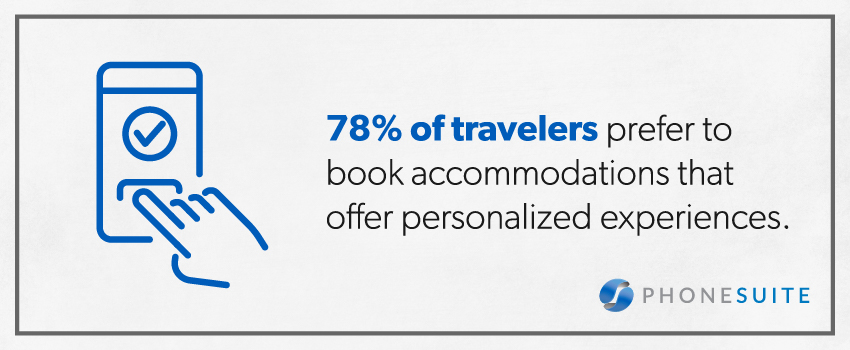
Support and Training
Consider the level of support your chosen provider offers, such as:
- 24/7 technical support to keep your system running at all times
- Comprehensive training for your staff
- Resources like user guides and video tutorials
Comprehensive support and training help your team fully leverage your cloud telephony system. When staff feel confident and supported, they can focus on delivering exceptional guest experiences.
Cost and Contract Terms
While cost shouldn’t be the only factor in your purchase decision, it’s still an important consideration. Make sure you:
- Understand the pricing structure (per user, per minute, or a combination)
- Evaluate hardware costs and whether equipment is leased or purchased
- Review additional charges for premium features or support levels
- Consider the length of the contract and early termination fees
Understanding this information can help you prevent surprises and align your investment with your business goals. The right provider can offer fair, transparent pricing that delivers value for your hotel.
Industry Experience
A provider with experience in the hospitality sector can offer valuable insights. Here’s how to investigate their track record:
- Look for case studies or testimonials from other hotels
- Ask about industry-specific features or integrations
- Check if they offer hospitality-specific training for your staff
- Request references from similar properties in your market segment
Selecting a provider with hospitality expertise means working with a partner who understands your needs. Their industry-specific knowledge can prove invaluable in optimizing your communication system for the unique demands of hotel operations.
Get Started With a Cloud Telephony System for Hospitality
From streamlining internal business communications to providing personalized services, cloud telephony empowers hotel staff to work more efficiently and respond more effectively to guest needs. As hospitality trends like contactless check-ins and mobile-first experiences gain traction, having a flexible, cloud-based communication system becomes even more crucial.
At Phonesuite, we know hospitality – and we designed our cloud phone system with hotel needs in mind. Say goodbye to your outdated business phone system with a cloud-based solution that provides all the features and functionality you need to run your hotel, including:
- Call Management: Manage your phone system features in an easy-to-navigate web portal.
- Auto Attendant: Greet callers with a custom message and automatically route phone calls to the right staff member.
- Room Status/Maid Code Updates: Keep your guests happy and your operations running smoothly.
- Audio/Video Conferencing: Meet with your team from any internet-connected device and any location.
Ready to elevate your hotel’s communications? Contact the Phonesuite team today to get started with a hospitality phone system that’s hosted in the cloud.
Sources:



